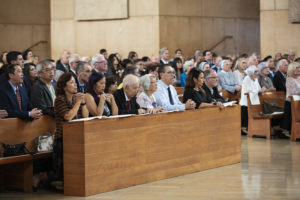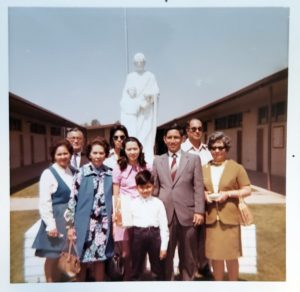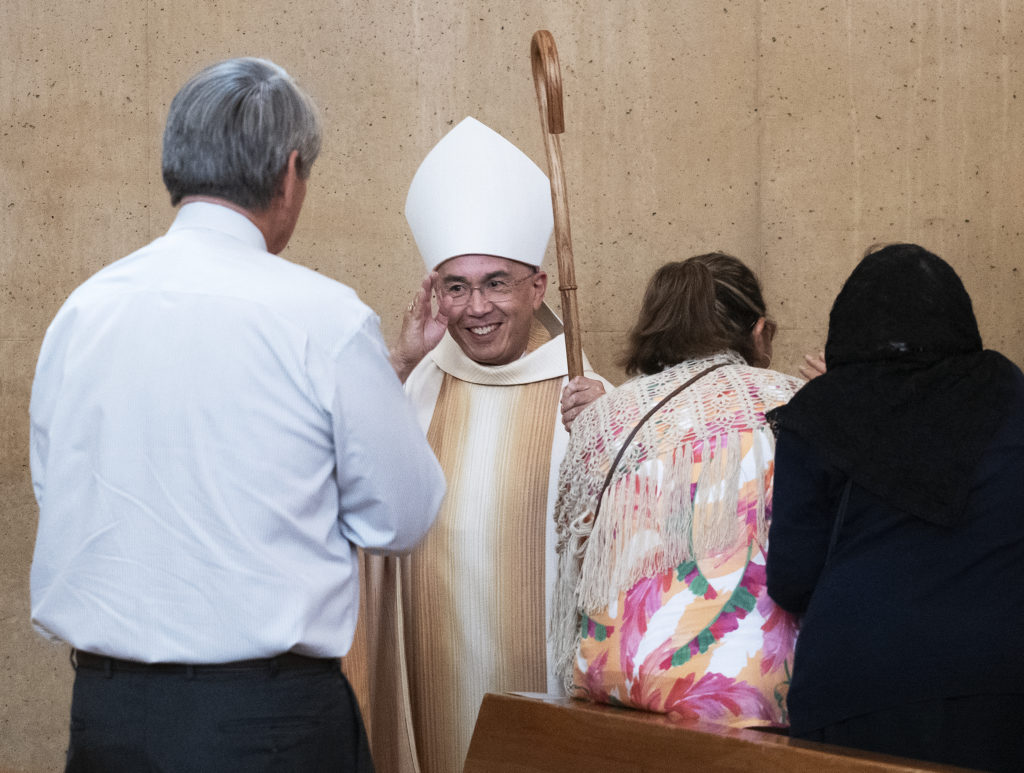It was like a secret club, a unique world where the only way to gain admittance was to be from an area surrounding a small estuary near China.
That place was Hong Kong — close to China, but then under British rule — and across the estuary was Macau, where the Portuguese had settled centuries ago. So Chinese, Portuguese, with some English thrown in.
This was the world that Bishop Brian Nunes grew up in, but instead of thousands of miles away, it was in the houses and backyards of relatives in Southern California who had immigrated from that special location, including his parents.
As more families began the long journey from Hong Kong and Macau to the United States, they kept in touch with others as to where they landed. Since they were all so tight-knit, it stands to reason they would want to land near one another. Eventually, many of them landed in Southern California.
And that’s when the get-togethers would happen. Birthday parties. Christmas. Easter.
It was a world made special by the language, a strange concoction of syllables in English, Chinese, and Portuguese, where the words didn’t always seem to be in the right order, or conjugated exactly right.
And the food — oh, the glorious food. An overflowing mix of dumplings and spices and unique meat dishes, ones with names like minchi, chau-chau pele, and chilicotes.
“It was like this secret that was kind of like all ours that nobody else knew what it was,” Nunes said.

Nunes’ father, Robert, now 89, made the trip to the U.S. in the late 1950s, stopping in San Francisco before making his way down to Los Angeles. Nunes’ mother, Yvonne, now 81 but then only a teenager, came later with her mother and siblings. The two had known of each other through their families but didn’t reconnect until they were both in Los Angeles.
They got married and Brian was born shortly after. Every couple of years, a sibling was born, first Michael, then Anne, and finally Denise.
The family moved to Yorba Linda, but that didn’t stop the gatherings, the hundreds of people, the stories.
Michael remembered going to a birthday party for his great-grandmother — who lived to be more than 100 — and seeing his brother Brian, who was into radio and recording, interviewing family members.
“It’s like 125 people and it was kids trying to understand what all these adults are saying in a kind of foreign language and enjoy the food and listen to stories,” Michael said. “Brian was the kid walking around with a tape recorder. He was walking around interviewing aunts and uncles and grandparents.”
“It was really interviewing my great-grandmother,” Brian said. “I still have this little recording of her telling stories.”
Being a part of this unique mix of Portuguese and Chinese did have its disadvantages, though.
“The first thing that I think I didn’t like was that nobody knew where these places were, especially in elementary school,” Brian said. “No one ever heard of Hong Kong. No one’s ever heard of Macau. Most people didn’t even know what Portuguese was.”
“Nobody knew what that was,” said Denise Johnson, Brian’s sister. “Then they figured out, ‘Oh, it’s Portugal.’ And I’m like, oh, but that’s not where my parents are from. So then that was more confusing.”
“Our grandparents basically said, ‘You are Portuguese, that’s your heritage,’ ” Michael said. “As a kid growing up, you could tell everybody I’m Portuguese and they would say, ‘But you look Chinese.’
“I think that we all probably struggled with that a bit.”

With his family history so dear to his heart, Bishop Nunes has taken great interest in doing genealogical research to discover more of his family tree. “You could spend days talking family tree and stuff with him because he really got into that and the history,” said his sister, Anne.
That research has led him across the country and across the world in search of findings, distant relatives, and greater connections.
He’s even been to Hong Kong and Macau a few times, including once where he was able to take his parents back.
“It was great to see all of these places that I had heard about,” Nunes said. “It was great to see their reactions to this place. Mom had been back a couple of times, but Dad had not been back since he had come to the United States in the late ’50s. And so it was amazing to see how unfamiliar he was with it because of how much it had changed.”
Ultimately, Nunes sees the blessings he’s had with this unique culture and the connections he’s made, just as he’s had in the Church.
“It’s this common heritage that you don’t get anywhere else,” Nunes said. “But also just this comfort level, even though there’s people I don't know that I would only see once a year, but to know that we were connected.
“Reflecting on that, it’s sort of like how we are as a Church. We gather together in church, maybe there’s people we don’t see, except in church. We may not even know everybody’s name. But there’s this thing that we have in common and that’s a great comfort level I think, too.”

